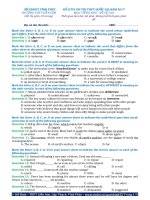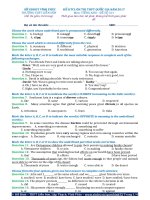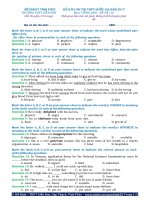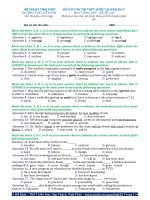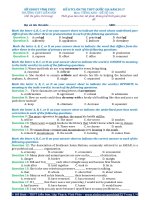GCSE TESTS
Bạn đang xem bản rút gọn của tài liệu. Xem và tải ngay bản đầy đủ của tài liệu tại đây (72.41 KB, 5 trang )
SƠ GD&ĐT VINH PHUC
TRƯƠNG THPT LIÊN SƠN
(Đề thi gồm: 05 trang)
ĐỀ KTCL ƠN THI THPT QUỐC GIA NĂM 20182019
Mơn: TIẾNG ANH – ĐỀ SỐ 019
Thời gian làm bài: 60 phút, không kể thời gian phát
đề
Ho va tên thi sinh:……………………………………………………………………. SBD:…………………………
Read the following passage and mark the letter A, B, C, or D on your answer sheet to indicate
the correct answer to each of the questions.
Animals have an intuitive awareness of quantities. They know without analysis the difference
between a number of objects and a smaller number. In his book “ The natural History of Selboure ”
(1786), the naturalist Gilbert White tells how he surreptitiously removed one egg a day from a
plover’s nest , and how the mother laid another egg each day to make up for the missing one. He
noted that other species of birds ignore the absence of a single egg but abandon their nests if more
than one egg has been removed. It has also been noted by naturalists that a certain type of wasp
always provides five – never four, never six - caterpillars for each of their eggs so that their young
have something to eat when the eggs hatch. Research has also shown that both mice and pigeons
can be taught to distinguish between odd and even numbers of food pieces.
These and similar accounts have led some people to infer that creatures other than humans
can actually count. They also point to dogs that have been taught to respond to numerical questions
with the correct number of barks, or to horses that seem to solve arithmetic problems by stomping
their hooves the proper number of times.
Animals respond to quantities only when they are connected to survival as a species – as in
the case of the eggs – or survival as individuals - as in the case of food. There is no transfer to other
situations or from concrete reality to the abstract notion of numbers. Animals can “count” only
when the objects are present and only when the numbers involved are small – not more than seven
or eight. In lab experiments, animals trained to “count” one kind of object were unable to count any
other type. The objects, not the numbers, are what interest them. Animals admittedly remarkable
achievements simply do not amount to evidence of counting, nor do they reveal more than innate
instincts, refined by the genes of successive generations, or the results of clever, careful conditioning
by trainers.
Question 01: What is the main idea of this passage?
A. Although animals may be aware of quantities, they cannot actually count.
B. Of all animals, dogs and horses can count best.
C. Careful training is required to teach animals to perform tricks involving numbers
D. Animals cannot “count” more than one kind of object.
Question 02: Why does the author refer to Gilbert White’s book in line 2?
A. To indicate that more research is needed in this field.
B. To show how attitudes have changed since1786.
C. To provide evidence that some birds are aware of quantities.
D. To contradict the idea that animals can count.
Question 03: The word “surreptitiously” is closest in meaning to________.
A. quickly
B. occasionally
C. stubbornly
D. secretly
Question 04: The word “odd” refers to which of the following?
A. numbers such as 1, 3, 5 and so on
B. lucky numbers
C. numbers such as 2, 4, 6 and so on
D. unusual numbers
Question 05: The author mentions that all of the following are aware of quantities in some ways
EXCEPT________.
A. wasps
B. Plovers
C. caterpillars
D. mice
Question 06: The word “accounts” is closest in meaning to
A. reasons
B. reports
C. deceptions
D. invoices
Question 07: How would the author probably characterize the people who are mentioned in the
first line of the second paragraph________.
A. As foolish
B. As demanding
C. As clever
D. As mistaken
Mark the letter A, B, C, or D on your answer sheet to indicate the word whose underlined part
differs from the other three in pronunciation in each of the following questions.
Question 08: A. blamed
B. misused
C. dissolved
D. increased
Question 09: A. blouses
B. amuses
C. purses
D. pleases
Mark the letter A, B, C, or D on your answer sheet to indicate the underlined part that needs
correction in each of the following questions.
Question 10: Ancient people used pot for cooking, storing food, and carrying things from place to
place.
A. pot
B. cooking
C. carrying
D. from
Question 11: Chemical engineering is based on the principles of physics, chemists, and mathematics.
A. on
B. principles
C. chemists
D. mathematics
Question 12: David is particularly fond of cooking, and he often cooks really delicious meals.
A. particularly
B. cooking
C. often cooks
D. really
Mark the letter A, B, C, or D on your answer sheet to indicate the word(s) OPPOSITE in meaning
to the underlined word(s) in each of the following questions.
Question 13: As a newspaper reporter, she always wanted to get information at first hand.
A. indirectly
B. easily
C. slowly
D. directly
Question 14: The loss of his journals had caused him even more sorrow than his retirement from
the military six years ealier.
A. grief
B. sympathy
C. comfort
D. joy
Mark the letter A, B, C, or D on your answer sheet to indicate the word that differs from the rest
in the position of the main stress in each of the following questions.
Question 15: A. competent
B. computer
C. compliance
D. commuter
Question 16: A. employ
B. evoke
C. powder
D. immune
Read the following passage and mark the letter A, B, C, or D on your answer sheet to indicate
the correct answer to each of the questions.
We find that bright children are rarely held back by mixed-ability teaching. On the contrary,
both their knowledge and experience are enriched. We feel that there are many disadvantages in
streaming pupils. It does not take into account the fact that children develop at different rates. It
can have a bad effect on both the bright and the not-so-bright child. After all, it can be quite
discouraging to be at the bottom of the top grade!
Besides, it is rather unreal to grade people just according to their intellectual ability. This is
only one aspect of their total personality. We are concerned to develop the abilities of all our pupils
to the full, not just their academic ability. We also value personal qualities and social skills, and we
find that mixed-ability teaching contributes to all these aspects of learning.
In our classroom, we work in various ways. The pupils often work in groups; this gives them
the opportunity to learn to co-operate, to share, and to develop leadership skills. They also learn
how to cope with the personal problems as well as learning how to think, to make decisions, to
analyze and evaluate, to communicate effectively. The pupils learn from each other as well as from
the teachers.
Sometimes the pupils work in pairs; sometimes the work on individual tasks and
assignments, they can do this at their own speed. They also have some formal class teaching when
this is appropriate. We encourage our pupils to use the library, and we teach them the skills they
need in order to do this effectively. An advanced pupil can do advanced works; it does not matter
what age the child is. We expect our pupils to do their best, not their least, and we give them every
encouragement to attain this goal.
Question 17: Which of the following is NOT mentioned in the passage?
A. Group work gives pupils the opportunity to learn to work together with others
B. Pupils also learn how to participate in teaching activities
C. Group work provides the pupils with the opportunity to learn to be capable organizers
D. Pupils also learn to develop their reasoning ability
Question 18: According to the passage, which of the following is NOT true?
A. It's not good for a bright child tofind out that he performs worst in a mixed-ability class
B. There is nofixed method in teaching pupils to develop themselves to the full
C. Development of pupils as individuals is not the aim of group work
D. Pupils cannot develop in the best way if they are streamed into classes of different
intellectual abilities
Question 19: According to the passage, which of the following is an advantage of mixed-ability
teaching?
A. A pupil can be at the bottom of a class.
B. Formal class teaching is the important way to give pupils essential skills such as those to
be used in the library.
C. Pupils can be hindered from an all-round development.
D. Pupils as individuals always have the opportunities to work on their own.
Question 20: According to the passage, "streaming pupils"________.
A. is the act of putting pupils into class according to their academic abilities
B. aims at enriching both their knowledge and experience
C. will help the pupils learn best
D. is quite discouraging
Question 21: According to the author, mixed-ability teaching is more preferable because________.
A. children can learn to work with each other to solve personal problems
B. it doesn't have disadvantages as in streaming pupils
C. formal class teaching is appropriate
D. its aim at developing the children's total personality
Question 22: The phrase "held back" in paragraph 1 means________.
A. forced to study in lower class
B. made to lag behind
C. prevented from advancing
D. made to remain in the same classes
Question 23: The author's purpose of writing this passage is to________.
A. recommend pair work and group work classroom activities
B. emphasize the importance of appropriate formal classroom teaching
C. offer advice on the proper use of the school library
D. argue for teaching bright and not-so-bright pupils in the same class
Question 24: The author argues that a teacher's chief concern should be the development of the
pupils'________.
A. learning ability and communicative skills
B. personal and social skills
C. total personality
D. intellectual abilities
Read the following passage and mark the letter A, B, C, or D on your answer sheet to indicate
the correct word or phrase that best fits each of the numbered blanks.
Engineers have been dreaming of an underwater link between Britain and France since
1802. Finally, in 1994the Channel Tunnel (nickname “the Chunnel” by the English) was officially
opened. This fifteen million dollar project took seven years to complete .It is 50km long and built 45
metres under the seabed. The trains which go through the Chunnel can travel at up to 300km/h due
to the (25)_______ electrical system.
The journey from London to Paris via the Chunnel takes just three hours. It is also handy for
drivers since they can load their cars onto the trains. They don’t need to book in (26)_______, as trains
depart every few minutes. However, while on the train, there isn’t much to do and many criticise the
Chunnel for this. Unlike the ferries, there is no duty- free shopping, no video game parlour or
refreshment stand (27)_______ can you look outside and enjoy the view. As a result, many would find
the Chunnel (28)_______ and would take the ferry (29)_______.
Question 25: A. forward
B. advanced
C. progressiveD. improved
Question 26: A. advance
B. time
C. ahead
D. future
Question 27: A. Nor
B. Either
C. Neither
D. Not
Question 28: A. unlikely
B. unwanted
C. unappealing
D. unpopular
Question 29: A. instead
B. however
C. rather
D. otherwise
Mark the letter A, B, C, or D on your answer sheet to indicate the correct answer to each of the
following questions.
Question 30: ~ "I'm very sorry for letting you wait for so long." ~ "________________ "
A. It's doesn't matter. Thank you.
B. You're welcome.
C. My pleasure. Don't worry about it.
D. Don't apologize. I've just arrived here.
Question 31: Gardeners transplant bushes and flowers by moving them from one place to________.
A. another
B. each other
C. others
D. other
Question 32: A few natural elements exist in________ that they ate rarely seen in their natural
environments.
A. so small quantities
B. very small qualities
C. small quantity
D. such small quatities
Question 33: Could you please________ me to the nearest post office?
A. direct
B. point
C. indicate
D. explain
Question 34: I'd rather you________ anything about the garden until the weather improves.
A. don't make
B. don't do
C. didn't make
D. didn't do
Question 35: It's very cold in here. Do you mind if I________ the heating?
A. put up with
B. put off
C. put down
D. put on
Question 36: We're over the________! Who wouldn't be? We've just won $1 million.
A. clouds
B. moon
C. stars
D. planet
Question 37: He is very________ of his conduct and promises never to behave like that again.
A. guilty
B. ashamed
C. sorry
D. miserable
Question 38: ~ " Would you like me to send this package for you? ~ "________________ "
A. That would be nice. Any problems?
B. No thanks, I'm very busy.
C. Yes, please, if you don't mind.
D. I'm sorry, but here you are.
Question 39: Of course you'll pass. You write well and you have an exellent________ of the subject.
A. grip
B. embrace
C. seizure
D. grasp
Question 40: As towns grow, they tend to destroy the surrounding________ areas.
A. rural
B. commercial
C. land
D. urban
Question 41: Candles________ I from beeswax bum with a very clean flame.
A. making
B. which made
C. made
D. are made
Question 42: Noisy parties are really not mine
A. idea
B. liking
C. scene
D. preference
Question 43: The exhibition is free for all students. W e________ pay any fee.
A. must not
B. should not
C. had better not
D. haven't got not
Mark the letter A, B, C, or D on your answer sheet to indicate the sentence that is closest in
meaning to each of the following questions.
Question 44: I really regret that you haven't told me about her family.
A. If only I didn't regret that you hadn't told me about her family.
B. If only you had not told me about her family.
C. If only you told me about her family.
D. If only you had told me about her family.
Question 45: "I say again. This is the most important assignment of the semester," the professor said.
A. The professor informed that that was the most important assignment of the semester.
B. The professor confirmed that that was the most important assignment of the semester.
C. The professor replied that that was the most important assignment of the semester.
D. The professor threatened that that was the most important assignment of the semester.
Question 46: My uncle is a businessman. He was ranked the wealthiest of the country.
A. A businessman, who is my uncle, was ranked the wealthiest of the country.
B. My uncle is a businessman, ranking the wealthiest of the country.
C. My uncle, a businessman, was ranked the wealthiest of the country.
D. A businessman, my uncle, was ranked the wealthiest of the country.
Question 47: I don't think Max broke your vase because he wasn't here then.
A. Max wasn't able to break your vase because he wasn't here then.
B. Max was likely to break your vase because he wasn't here then.
C. Max wouldn't have broken your vase because he wasn't here then.
D. Max can't have broken your vase because he wasn't here then.
Question 48: There were over 2000 people at Carl's trial. Most of them believed that he was not guilty
of the crime.
A. When it was announced that Carl had been found not guilty of the crime, there were over
2000 people in the audience at his trial.
B. Over 2000 people coming to Carl's trial must have influenced the fact that he was not
found guilty of the crime.
C. The majority of the more than 2000 people at Carl's trial think that he had committed the
crime.
D. Carl had not committed the crime, and so more than 2000 people came to his trial to show
their support.
Mark the letter A, B, C, or D on your answer sheet to indicate the word(s) CLOSEST in meaning
to the underlined word(s) in each of the following questions.
Question 49: I told you clearly and definitely not to write your answer in pencil, Tom!
A. altogether
B. considerably
C. specifically
D. thoroughly
Question 50: The washing machine I have just bought is very simple to use.
A. easy
B. interesting
C. difficult
D. boring
_________THE END_________
